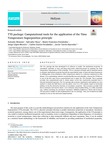Mostrar o rexistro simple do ítem
TTS package: Computational tools for the application of the Time Temperature Superposition principle
| dc.contributor.author | Meneses Freire, Antonio | |
| dc.contributor.author | Naya, Salvador | |
| dc.contributor.author | Francisco-Fernández, Mario | |
| dc.contributor.author | López-Beceiro, Jorge | |
| dc.contributor.author | Gracia-Fernández, Carlos | |
| dc.contributor.author | Tarrío-Saavedra, Javier | |
| dc.date.accessioned | 2023-11-27T17:27:48Z | |
| dc.date.available | 2023-11-27T17:27:48Z | |
| dc.date.issued | 2023 | |
| dc.identifier.citation | Meneses, A. et al. (2023) ‘TTS package: Computational tools for the application of the time temperature superposition principle’, Heliyon, 9(5). doi:10.1016/j.heliyon.2023.e15816. | es_ES |
| dc.identifier.issn | 2405-8440 | |
| dc.identifier.uri | http://hdl.handle.net/2183/34346 | |
| dc.description.abstract | [Abstract]: The TTS package has been developed in R software to predict the mechanical properties of viscoelastic materials, at short and long observation times/frequencies by applying the Time Temperature Superposition (TTS) principle. TTS is a physical principle used in material science to estimate mechanical properties beyond the experimental range of observed times/frequencies by shifting data curves obtained at other temperatures relative to a reference temperature in the dataset. It is a methodology related to accelerated life-tests and reliability, whereas the TTS library is one of the first open source computational tool to apply the TTS principle. This R package provides free computational tools to obtain master curves that characterize materials from a thermal-mechanical approach. The TTS package also proposes, implements and explains our own method to obtain the shift factors and the master curve in a TTS analysis, based on horizontal shifting of the first derivative function of viscoelastic properties. This procedure provides shift factors estimates and smooth master curve estimates using B-spline fitting, in a fully automatic way, without assuming any parametric expression. Williams-Landel-Ferry (WLF) and Arrhenius TTS parametric models are also implemented in the TTS package. They can be fitted from shifts obtained by the our first derivative based method. | es_ES |
| dc.description.sponsorship | This work has been supported by Campus Industrial de Ferrol (Universidade da Coruña), Ministerio de Ciencia e Innovación grant PID2020-113578RB-100 and by the Xunta de Galicia (Grupos de Referencia Competitiva ED431C-2016-015 and Centro Singular de Investigación de Galicia ED431G/01), all of them through the ERDF. The authors would like to express their gratitude to the two reviewers of this article, whose contributions and suggestions have made a significant contribution to providing users with a truly useful tool. | es_ES |
| dc.description.sponsorship | Xunta de Galicia; ED431C-2016-015 | es_ES |
| dc.description.sponsorship | Xunta de Galicia; ED431G/01 | es_ES |
| dc.language.iso | eng | es_ES |
| dc.publisher | Elsevier | es_ES |
| dc.relation | info:eu-repo/grantAgreement/AEI/Plan Estatal de Investigación Científica y Técnica y de Innovación 2017-2020/PID2020-113578RB-I00/ES/METODOS ESTADISTICOS FLEXIBLES EN CIENCIA DE DATOS PARA DATOS COMPLEJOS Y DE GRAN VOLUMEN: TEORIA Y APLICACIONES | es_ES |
| dc.relation.uri | https://doi.org/10.1016/j.heliyon.2023.e15816 | es_ES |
| dc.rights | Atribución-NoComercial-SinDerivadas 3.0 España | es_ES |
| dc.rights | https://creativecommons.org/licenses/by-nc-nd/4.0/ | es_ES |
| dc.rights.uri | http://creativecommons.org/licenses/by-nc-nd/3.0/es/ | * |
| dc.subject | Time Temperature Superposition | es_ES |
| dc.subject | Thermal analysis | es_ES |
| dc.subject | Statistical modeling | es_ES |
| dc.subject | R software | es_ES |
| dc.title | TTS package: Computational tools for the application of the Time Temperature Superposition principle | es_ES |
| dc.type | info:eu-repo/semantics/article | es_ES |
| dc.rights.access | info:eu-repo/semantics/openAccess | es_ES |
| UDC.journalTitle | Heliyon | es_ES |
| UDC.volume | 9 | es_ES |
| UDC.issue | 5 | es_ES |
| dc.identifier.doi | 10.1016/j.heliyon.2023.e15816 |
Ficheiros no ítem
Este ítem aparece na(s) seguinte(s) colección(s)
-
GI-MODES - Artigos [122]






